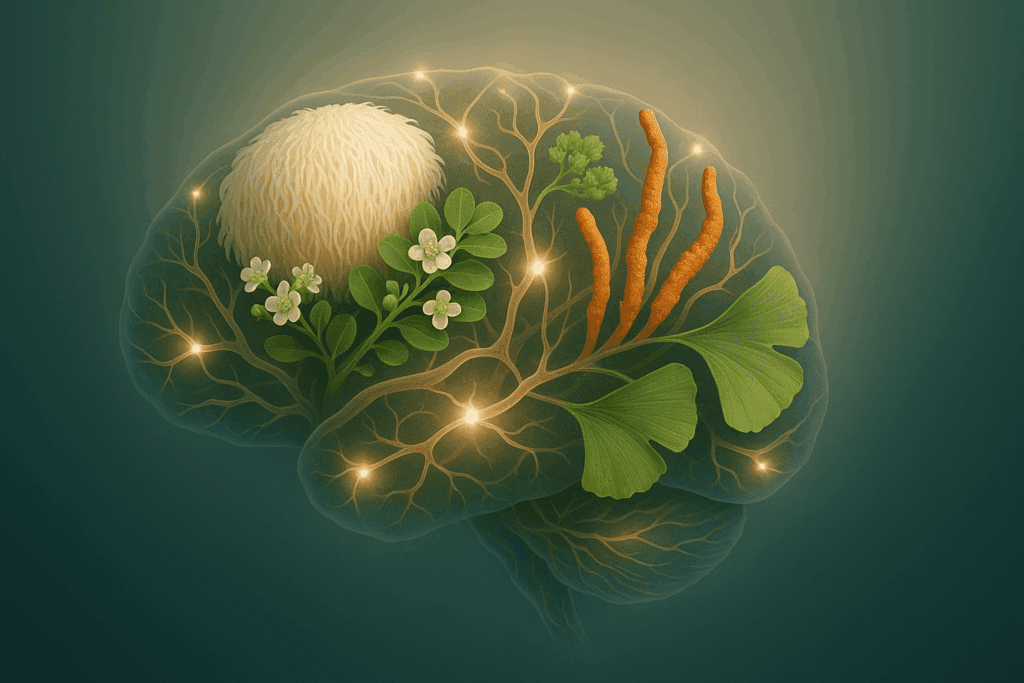In a fast-paced, high-demand work environment, stress and fatigue are more than just inconveniences—they’re chronic obstacles to productivity, creativity, and mental well-being. Increasingly, professionals are turning to natural strategies for sustaining energy and focus, among them adaptogenic mushrooms and herbal supplements. These powerful botanical allies are emerging as trusted solutions in the growing landscape of supplements for work, where the goal isn’t just to keep going, but to thrive under pressure with clarity and calm.
You may also like: Unlock Powerful Stress-Relief with Adaptogenic Mushrooms and Stamina Herbal Support

Understanding Adaptogens: Nature’s Stress-Relief Agents
Adaptogens are a unique class of herbs and natural substances that help the body adapt to stress, regulate physiological functions, and restore balance. Unlike stimulants, which push the body into overdrive, adaptogens work more subtly. They support the hypothalamic-pituitary-adrenal (HPA) axis and modulate the body’s stress response, thereby improving resilience and recovery. This is critical in workplace environments where emotional and physical stressors are not only persistent but often cyclical, arising from tight deadlines, interpersonal dynamics, and cognitive overload.
Historically, adaptogens have roots in traditional systems of medicine, such as Ayurveda and Traditional Chinese Medicine (TCM). Herbs like ashwagandha, rhodiola, and ginseng have been used for centuries to improve endurance and fortify the nervous system. The modern interest in adaptogens, however, is fueled by clinical studies validating their effects on cortisol regulation, mental clarity, and fatigue resistance. This resurgence underscores their relevance as part of stress-relief and anxiety support protocols, particularly in professional settings.

Introducing Adaptogenic Mushrooms: The Mycological Marvels
Among the most fascinating developments in the world of adaptogens is the spotlight on adaptogenic mushrooms. These fungi are gaining popularity not just for their nutrient density but for their remarkable adaptogenic properties. Leading the pack are reishi, lion’s mane, cordyceps, and chaga—each with a distinct profile of benefits that complement the needs of working professionals.
Reishi, often called the “mushroom of immortality,” is revered for its calming effects and immune-modulating capabilities. For individuals experiencing workplace burnout or chronic anxiety, reishi can help promote restful sleep and emotional balance. Lion’s mane is prized for its neurotrophic effects, particularly its ability to stimulate nerve growth factor (NGF), which supports cognitive performance, memory, and focus—ideal for knowledge workers and creatives. Cordyceps, with its energy-enhancing properties, benefits those who need sustained stamina without the jitteriness of caffeine. Meanwhile, chaga offers antioxidant protection, supporting cellular health and resilience in the face of oxidative stress.

Supplements for Work: Choosing the Right Support System
When it comes to supplements for work, effectiveness is paramount. In a sea of options, it is essential to distinguish between marketing claims and scientifically supported interventions. The ideal supplement supports both acute needs, such as heightened focus before a presentation, and chronic demands, like managing ongoing fatigue or emotional exhaustion.
One of the key challenges facing consumers is determining what supplements actually work. The answer lies in a combination of evidence-based research, practitioner guidance, and personal experimentation. For instance, combining lion’s mane with B-complex vitamins may yield synergistic effects on mental clarity and energy metabolism. Similarly, stacking rhodiola with cordyceps can enhance both physical endurance and mood stability. However, quality control matters. Reputable brands that prioritize third-party testing, full-spectrum extracts, and sustainable sourcing provide a level of assurance that is non-negotiable in an industry often plagued by inconsistency.
Integrating Adaptogens into a Daily Work Routine
For supplements to deliver meaningful results, consistency is key. Adaptogens are not quick fixes; rather, they accumulate in the system, gradually restoring balance and resilience. Incorporating adaptogenic mushrooms into a morning ritual—such as a lion’s mane latte or reishi tea—can set a grounded tone for the day. Midday energy dips might benefit from cordyceps capsules or a rhodiola tincture added to water. Evening wind-down routines can include ashwagandha or reishi, calming the nervous system and preparing the body for restorative sleep.
Mindful supplementation also involves timing and context. Taking cordyceps before a workout or lion’s mane before deep work sessions can enhance task-specific performance. Conversely, using calming adaptogens during high-stress periods can prevent adrenal overload. The goal is not to rely solely on supplements but to use them strategically, in conjunction with good nutrition, hydration, movement, and sleep hygiene.

What Supplements Actually Work for Cognitive Endurance?
Cognitive endurance—the ability to maintain mental focus and performance over time—is a prized asset in today’s work culture. While coffee remains a popular go-to, its downsides are well known: crashes, anxiety, and dependence. Natural alternatives that sustain energy without these drawbacks are increasingly in demand. Here, certain adaptogens excel, especially when combined with nootropic ingredients.
Lion’s mane stands out for its role in neurogenesis and synaptic plasticity. Studies suggest it may support memory recall and concentration over time. Bacopa monnieri, another adaptogenic herb, has been shown to improve cognitive processing speed and reduce stress-related forgetfulness. These effects are particularly valuable for individuals who engage in complex problem-solving, multitasking, or learning-intensive roles. Supplement blends that incorporate these herbs alongside essential nutrients like magnesium and L-theanine offer a holistic solution that supports both brain function and emotional regulation.
Moreover, phosphatidylserine and acetyl-L-carnitine, while not technically adaptogens, often accompany adaptogenic formulas because of their impact on mental clarity and cellular energy. Including these in a work-focused supplement routine can create a layered defense against cognitive fatigue. The evidence is clear: when chosen wisely and used consistently, these supplements do more than alleviate symptoms—they foster long-term cognitive resilience.

How Adaptogenic Mushrooms Fit Into Workplace Wellness
Workplace wellness programs increasingly recognize the value of integrative health solutions, including nutritional and botanical support. Adaptogenic mushrooms fit seamlessly into this paradigm. Their benefits are not limited to individual users; they have the potential to enhance organizational health by promoting focus, emotional intelligence, and immunity—traits that contribute to a more engaged and resilient workforce.
Companies offering functional beverages with ingredients like lion’s mane or reishi in break rooms signal a culture of proactive well-being. Similarly, leadership seminars that include education about supplements for work create a ripple effect of awareness and empowerment. Even casual conversations among coworkers about natural ways to cope with stress contribute to a more open, health-conscious atmosphere.
Furthermore, adaptogenic mushrooms are increasingly featured in workplace-friendly formats: powders for smoothies, capsule blends for travel, or infused snack bars for midday slumps. These formats reduce friction for busy professionals who need convenience without compromising efficacy. In this way, adaptogens are no longer fringe elements but integral tools in the evolving wellness toolkit of modern professionals.
Examining Safety, Efficacy, and Contraindications
While adaptogenic mushrooms and herbal supplements are generally well-tolerated, safety must remain a top priority. Not all adaptogens are appropriate for everyone. For example, individuals with autoimmune conditions should consult a healthcare provider before taking immune-stimulating mushrooms like reishi or chaga. Likewise, certain adaptogens may interact with medications, including antidepressants, thyroid medications, or blood pressure drugs.
Dosage is another critical consideration. More is not always better. Effective doses vary depending on the herb and the individual. Clinical research provides general guidelines, but personal biofeedback—paying attention to how the body responds—is equally important. Rotating supplements and taking periodic breaks (a practice known as cycling) can also reduce the risk of tolerance or dependency.
Moreover, understanding the sourcing and preparation of adaptogens matters. Wild-harvested mushrooms may contain higher levels of beneficial compounds than cultivated ones, but they also carry a risk of environmental contamination if not tested properly. Opting for organic, lab-verified, and sustainably harvested products mitigates this risk and aligns with a more responsible approach to wellness.
The Cultural Renaissance of Mushroom Medicine
Adaptogenic mushrooms are not new discoveries. Their use spans thousands of years and continents. What is new is the cultural renaissance surrounding them. In an era defined by both digital overload and ecological awareness, mushrooms embody a bridge between modern science and ancient wisdom. Their fungal networks mirror our own neural and social systems, offering a metaphorical and biological connection to balance.
This renaissance is visible in mainstream media, academic conferences, and even design aesthetics. Mushroom-themed cafes, biotech startups developing mycelial materials, and documentaries exploring fungi’s ecological roles all contribute to a growing fascination with the fungal kingdom. In this context, supplements for work are more than productivity tools—they are gateways into a broader, more integrated way of living and working.

Crafting a Personalized Supplement Strategy
Personalization is the future of health and wellness. With growing access to functional lab testing, genomic insights, and biofeedback tools, individuals can now fine-tune their supplement regimens to align with specific needs and goals. For example, someone with sluggish adrenal function might benefit more from ashwagandha and B5, while a cognitively fatigued individual might prioritize lion’s mane and L-theanine.
Building a personalized strategy begins with self-assessment. What are the most pressing work-related challenges? Is it mental fog, emotional burnout, or physical exhaustion? From there, one can match adaptogens and supportive nutrients accordingly. Logging energy levels, mood changes, and sleep quality over time can help refine the stack. Consulting with an integrative practitioner ensures that the regimen is both safe and aligned with long-term health objectives.
The beauty of adaptogenic supplements lies in their flexibility. They can be layered, rotated, and adjusted based on seasons, workload fluctuations, and life phases. This dynamic approach mirrors the adaptive nature of the herbs themselves, fostering not just resilience to stress but an evolving relationship with well-being.
Supplements for Work: Combining Adaptogens with Modern Productivity Tools
Incorporating supplements for work into a broader productivity framework can amplify results. Many professionals already use techniques like time blocking, deep work intervals, and mindfulness breaks. When adaptogens are layered onto these strategies, the effects can be transformative. For instance, taking lion’s mane before a Pomodoro session may enhance focus, while using reishi during a post-project recovery phase can aid emotional recalibration.
The integration goes beyond biochemistry. It touches on intentionality—choosing to approach work as a sustainable, evolving practice rather than a sprint toward burnout. Adaptogens, in this sense, are not merely tools for better output; they are allies in reshaping the ethos of work itself. They remind us that resilience is not about pushing harder but adapting smarter.
Future Frontiers in Adaptogen Research and Innovation
Scientific inquiry into adaptogens is accelerating, with new studies exploring their roles in neuroplasticity, mitochondrial health, and even gene expression. As analytical methods become more refined, researchers can isolate specific bioactive compounds and understand their mechanisms of action more precisely. This paves the way for targeted formulas designed to meet distinct workplace challenges, such as creative fatigue or emotional volatility.
Innovation is also occurring in delivery systems. Liposomal encapsulation, nanotechnology, and precision dosing apps are reshaping how supplements are absorbed and administered. These advancements increase bioavailability and reduce waste, making adaptogens more efficient and accessible. In parallel, consumer interest in sustainability is driving demand for regenerative farming practices and biodegradable packaging, aligning supplement use with broader ecological values.
The convergence of traditional knowledge and scientific innovation holds enormous potential. It validates the efficacy of time-honored botanicals while ensuring they meet the standards of modern efficacy and safety. In doing so, it opens new possibilities for enhancing work performance without compromising long-term well-being.
What Supplements Actually Work for Emotional Resilience at Work?
Emotional resilience—the capacity to remain calm, adaptable, and resourceful under stress—is essential in navigating workplace dynamics. Adaptogens like holy basil (tulsi), ashwagandha, and schisandra shine in this area. Holy basil has been shown to reduce cortisol levels and support a balanced mood. Ashwagandha, long used in Ayurvedic medicine, helps buffer the effects of chronic stress and improve sleep quality. Schisandra, a lesser-known adaptogen, supports adrenal health and enhances clarity during emotionally taxing periods.
Incorporating these herbs into a daily regimen, whether as teas, tinctures, or capsules, can provide a subtle but steady uplift in mood regulation. Emotional resilience is not about avoiding stress but about responding to it with equanimity and perspective. When combined with emotional intelligence training, reflective practices, and supportive workplace culture, adaptogens become powerful allies in shaping a more conscious professional identity.
Supplements for work that enhance emotional resilience thus play a dual role: they stabilize the nervous system in the moment and build cumulative reserves of adaptability over time. This long-range effect is particularly valuable in leadership roles, caregiving professions, and team-based environments where emotional tone can significantly influence outcomes.
Frequently Asked Questions: Adaptogenic Mushrooms and Stress-Relief Strategies for Work
How long does it take for adaptogenic supplements for work to start showing results?
Adaptogenic supplements for work generally take time to build up in the body before their full effects are noticeable. While some people report mild benefits such as improved focus or reduced anxiety within a few days, most evidence suggests that consistent use over two to four weeks yields more sustainable improvements. This timeframe allows the body’s stress-regulation systems—such as the HPA axis and adrenal glands—to respond more effectively to adaptogens like rhodiola, ashwagandha, and lion’s mane. It’s important to manage expectations: these are not instant fixes but long-term allies in stress adaptation and energy balance. To maximize their benefits, align supplementation with other healthy practices like mindfulness, hydration, and proper sleep hygiene.
Can I combine multiple adaptogens in one routine, and if so, how should I do it safely?
Yes, combining adaptogens can be highly effective when done thoughtfully. Stacking different adaptogens—such as lion’s mane for cognitive enhancement and ashwagandha for calming the nervous system—can create a multifaceted approach to workplace performance. However, synergy doesn’t always mean more is better. To avoid overstimulating or under-supporting certain systems, it’s essential to understand the actions of each herb and rotate or cycle them when needed. For example, combining cordyceps and rhodiola may boost stamina but could increase anxiety in sensitive individuals if not balanced with a calming adaptogen. Always start with low doses, observe how your body responds, and consult a functional health practitioner to tailor the approach to your physiology.
What is the best time of day to take supplements for work-related focus and energy?
Timing depends on the specific adaptogens used and your individual work schedule. For instance, lion’s mane is best taken in the morning or early afternoon to support concentration and prevent late-day cognitive fatigue. Cordyceps and rhodiola, known for their energizing effects, are most effective when taken before peak performance periods, such as morning meetings or pre-lunch deep work sessions. Conversely, calming adaptogens like reishi or holy basil should be taken in the evening to help ease stress accumulation. Synchronizing adaptogen intake with your circadian rhythm can also enhance hormonal balance, especially cortisol regulation, which directly affects productivity and recovery.
Are there any long-term effects of taking stress-relief supplements for work year-round?
Long-term use of stress-relief supplements for work is generally safe when managed properly, but it’s advisable to periodically reassess your regimen. Chronic use without rotation may lead to diminished effectiveness or unintended interactions with other medications or nutrients. Some practitioners recommend cycling—taking breaks every 8 to 12 weeks—to give your body time to reset and avoid habituation. Additionally, long-term supplementation should be viewed as part of a broader wellness strategy rather than a stand-alone solution. Over-reliance on adaptogens without addressing underlying lifestyle imbalances—like overworking, lack of sleep, or emotional burnout—can mask problems rather than resolve them.
What supplements actually work for improving motivation and drive at work?
Among the supplements that support motivation, rhodiola rosea is particularly noteworthy. It’s been shown to increase dopamine sensitivity, a neurotransmitter involved in goal-oriented behavior and reward perception. Paired with adaptogens like eleuthero and cordyceps, rhodiola can help reduce fatigue while preserving energy for tasks requiring willpower and persistence. Additionally, acetyl-L-carnitine and tyrosine—although not adaptogens—can synergize with these herbs to further enhance drive and mental stamina. These combinations support both the physical and psychological aspects of motivation, especially when used alongside mindset techniques like visualization and goal-setting. When evaluating what supplements actually work for motivation, it’s important to choose products backed by clinical research and manufactured with high-quality standards.
Can supplements for work improve emotional intelligence in high-stress jobs?
Yes, indirectly. While no supplement can directly alter personality traits, many can enhance self-regulation, a core pillar of emotional intelligence. Adaptogens like ashwagandha, reishi, and tulsi help stabilize mood, reduce emotional reactivity, and improve sleep—all of which are crucial for maintaining calm and clarity during interpersonal conflicts or high-pressure meetings. Over time, these improvements in stress tolerance and impulse control can foster better communication, empathy, and decision-making. For those in leadership or caregiving roles, these subtle benefits can be transformative. Combining adaptogens with mindfulness practices further accelerates the development of emotional intelligence by promoting presence and self-awareness.
How do I know what supplements actually work for my specific job type or industry?
The key lies in aligning your supplementation strategy with the cognitive, emotional, and physical demands of your profession. For example, a software engineer may benefit from lion’s mane and bacopa for sustained mental performance, while a frontline healthcare worker might need rhodiola and schisandra to manage emotional exhaustion and physical strain. Entrepreneurs juggling high decision-making loads may combine cordyceps for stamina with ashwagandha for stress resilience. Personalized supplementation begins with identifying recurring patterns of depletion—be it brain fog, irritability, or immune weakness—and then selecting evidence-based herbs and nutrients to match those needs. Logging daily mood, performance metrics, and sleep quality can provide actionable feedback to refine your stack over time.
Is there any scientific evidence supporting the use of adaptogenic supplements for work performance?
Yes, emerging studies and clinical trials provide a growing body of evidence supporting the use of adaptogens in work-related performance enhancement. Rhodiola rosea has been studied for its ability to reduce fatigue and improve cognitive performance in physicians working night shifts. Similarly, lion’s mane has demonstrated potential in improving mild cognitive impairment and enhancing memory recall. The mechanisms often involve modulation of the HPA axis, antioxidant protection, and neurotrophic support. While more large-scale trials are needed, the existing data offers promising insights into what supplements actually work for optimizing mental and emotional resilience. Research is increasingly focusing on how adaptogens interact with the microbiome and hormonal systems, paving the way for precision formulas based on biometrics and health markers.
Can supplements for work help reduce reliance on caffeine or stimulants?
Absolutely. One of the most compelling reasons professionals explore adaptogenic supplements for work is to reduce their dependence on caffeine. Unlike stimulants, adaptogens help regulate the body’s energy systems rather than forcing temporary spikes in alertness. Cordyceps, for instance, increases ATP production at the cellular level, promoting clean energy without the jittery crash associated with coffee. L-theanine, when paired with small amounts of caffeine, can smooth out overstimulation and improve focus. Over time, these tools can support a more stable productivity rhythm, reducing the need for multiple cups of coffee or energy drinks. Transitioning from caffeine to adaptogens also supports adrenal health, which is critical for long-term energy sustainability.
What are some emerging trends in the world of workplace supplements and adaptogens?
The supplement landscape is evolving rapidly, with innovation focusing on personalization, delivery formats, and integration with digital wellness tools. One exciting trend is the rise of precision supplements—customized blends based on genetic, hormonal, and microbiome data that match an individual’s specific work challenges. Another is the development of microdosing adaptogens, where smaller, more frequent doses are used throughout the day to support subtle shifts in mood and focus. Additionally, workplace wellness programs are beginning to include curated adaptogen kits as part of employee health packages. Supplement subscriptions, AI-driven dosage reminders, and even biometric feedback loops through smartwatches are integrating with how users engage with their regimens. These developments reflect a broader shift toward proactive, data-informed self-care in the modern work environment.
Final Reflections: Building Sustainable Success with Adaptogenic Support
As workplace expectations continue to evolve, so too must our strategies for maintaining mental and physical health. Supplements for work are not a panacea, but they offer meaningful support when integrated thoughtfully into a holistic lifestyle. The essential guide to adaptogenic mushrooms and stress-relief strategies reveals a growing body of evidence and practice affirming their value in cultivating focus, energy, and emotional balance.
By choosing quality products, tailoring regimens to individual needs, and aligning supplementation with broader wellness goals, professionals can build resilience that lasts. What supplements actually work will always depend on context, but when chosen with intention and backed by evidence, adaptogens provide a grounded, intelligent approach to meeting the demands of modern work life. In this integration of science, tradition, and self-awareness lies the foundation for a sustainable and inspired professional journey.
Further Reading:
The Supplements Doctors Actually Think You Should Take
